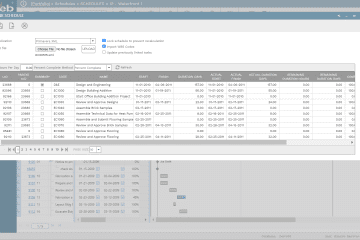For Engineering Consultants, EPC Contractors, Design-Build Contractors, and other entities whose work scope includes creating engineering deliverables such as drawings and specifications. They always need to plan the resources required to make those deliverables capture the actual resource hours spent in creating them. They need this information to enable them to monitor, evaluate and report on any variances, the reasons that have caused those variances, and the actual performance efficiency achieved to date to allow for them to implement the needed measures to improve the efficiency for the remaining scope of work to avoid resources overrun.
Using a Project Management Information System (PMIS) like PMWeb, Engineering Consultants, EPC Contractors, DB Contractors, and others can use PMWeb to plan the resources required for the complete project lifecycle phases design engineering phase. PMWeb allows capturing the actual resource hours spent during the design phase to monitor, evaluate, and report resource usage variances. Further, if the earned value (EV) for engineering deliverables is also provided, then the organization can create a report to monitor, evaluate and report on resource performance efficiency.
Determining the Engineering Phase Resources Requirement
Usually, Oracle Primavera P6 or MS Project will plan to determine and plan the engineering phase’s resources requirements. Activity will be created for each engineering phase deliverable to detail the actions needed to complete a deliverable. Those activities will be resource-loaded with the required resources and their staff hours. The project schedule’s resources requirement will be leveled to the extent possible to avoid having resources overload. Upon completion of this analysis, the resources requirement report will become the basis for determining the needed resources to be booked during the engineering or design phase of the project.

Planning the Project Resources Requirements
Understanding that when booking the resources for the design and engineering phases, there will be periods that the resources could be under-utilized because of how the project was planned. PMWeb resources requirement module will be used to book the resources needed for the design phase. This will be similar to the resources’ availability levels defined in Oracle Primavera P6 and MS Project. The organization can create multiple resource requirement forms for each phase or engineering discipline instead of having a single requirement form. Each requirement form can be linked to the schedule summary activity, which was imported from Primavera P6 or MS Project to PMWeb, for the design phases as an overall, design stages or engineering disciplines.

It is highly recommended that the engineering resources used by PMWeb use the same resource codes used in P6 or MS Project, although this is not a must requirement. The resources dictionary in PMWeb can be created to match the organization’s resources naming, codes, and values.

In addition, PMWeb allows using the Organization Chart module to create an organization chart to map the lines of authorities between the project team members, that is, resources, for the engineering design phase as an overall or even specific for each discipline. There is no limit on the number of organization charts that can be created for a project.

Capturing Actual Resources Hours Spent Using Timesheets
As the design or engineering phase commences, the PMWeb timesheet module will be used to capture the actual resource hours spent against each deliverable, which is an activity in the project’s detailed schedule. Those hours could be regular working hours, overtime hours, weekend hours, and holiday hours. A workflow will be assigned to the submission, review, and approval of the reported actual resource hours. The timesheet module will also allow capturing notes made by the project team concerning events that could have caused a disruption, rework, or other reasons that could have resulted in spending additional staff hours against the design deliverable.

Monitoring, Evaluating and Reporting Actual Man-Hours Spent Against Planned
The actual resource hours captured from the PMWeb timesheet module and the planned resource hours from the resource requirements module will be the basis for creating a real-time dashboard to monitor, evaluate and report the professional services resources utilization. In other words, the organization would be interested to know if the booked resources for a discipline or a phase was equal to the number of actual resource hours consumed. The report will also show the total resource working hours variance per quarter.

To report the resources’ performance efficiency, the Planned Value (PV) of resource usage for each engineering deliverable activity as per the resource loaded schedule and the Earned Value (EV) for the same deliverable action which will be calculated by multiplying the percent complete for each deliverable by the total resource hours allocated for the training (BAC) will be needed. The percent complete for each deliverable will be calculated under the set progress weight percentages set for engineering deliverables. Of course, the Actual Quantity (AC) of resource hours spent will also be needed, which is the actual hours captured in the PMWeb timesheets module.
Those values will be the basis for calculating earned value metrics, which will include Cost Variance (CV), which is “EV – AC,” Schedule Variance (SV), which is “EV – PV,” Cost Performance Index (CPI), which is “EV/AC” and Schedule Performance Index (SPI) which is “EV/PV.”




